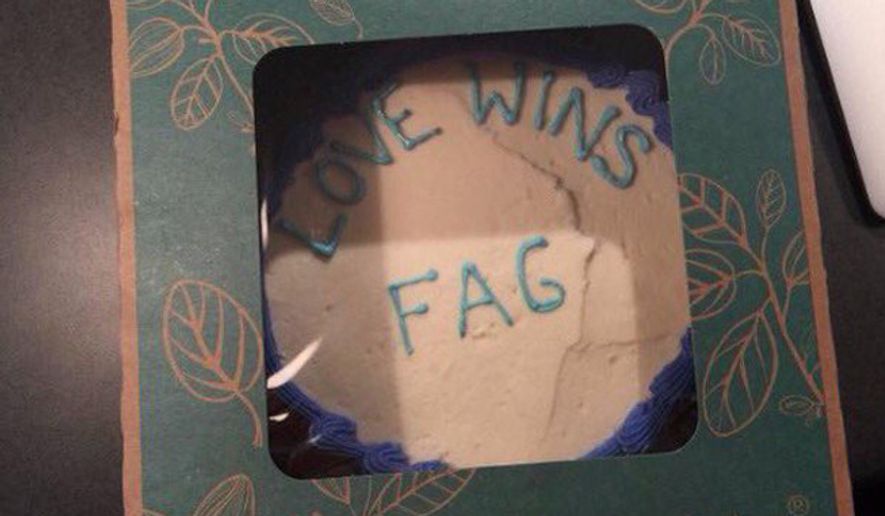In accusing Whole Foods of frosting a cake with a gay slur, Texas pastor Jordan Brown broke a trend of dubious hate crime accusations that had met little skepticism from the mainstream media.
With the advent of social media, the ability to levy accusations has dramatically increased, instantly connecting self-identified victims with activist organizations monitoring the Web for their latest political talking points. But, like how subprime loans intended to ease access to the mortgage market meant more defaults, ease of access and willing reporters have brought a new set of risks to the hate crime beat.
Take, for instance, the case of Dayna Morales, a lesbian waitress from New Jersey who in 2013 posted a picture of a receipt supposedly left by a bigoted customer. The pay stub is scrawled with a note explaining that Ms. Morales would not receive a tip because the customer disapproved of her sexuality.
The incident was covered by the nightly news, with extensive speculation and commentary about what the note says about the nation’s treatment of gays. Less attention was given to the rebuttal from the diners Ms. Morales served, who not only denied leaving the note but also said they left a tip.
“‘CBS This Morning’ covered the original claim and interviewed the waitress but didn’t follow up when her story was found to be filled with holes,” the Media Research Center’s Kristine Marsh wrote at NewsBusters.
“Co-workers later claimed that she had a history of lying, even once claiming to have terminal cancer, and they didn’t believe her story from the get-go. Odd that the media didn’t want to include these comments until after she was found out,” Ms. Marsh wrote.
Viewers of the CBS program would have heard only about discrimination against a lesbian because of her sexuality, not a follow-up report calling the accusation into question. Dan Gainor, vice president of business and culture at the Media Research Center, said that is deliberate.
“Journalists don’t spend a lot of time undermining memes that they agree with,” Mr. Gainor said. “I know the report is false, but the idea is true — that’s the way a lot of journalists look at it. So even if this particular report is false, the idea that ‘this will happen’ is true, so they don’t want to report it. There’s a fantasy that most journalists are neutral, but they’re just not.”
Mr. Gainor said even when they levy false accusations, the media seldom hold progressive activists accountable.
“So what happens is, a lot of times, these things, they fan, and the activists are OK with it because even if they’re bogus, they seldom get called on it,” he said. “It’s a case of just throwing as much dirt as you can on your opponents and knowing some of it will stick, even if it’s illegitimate.”
Mr. Brown’s case is exceptional because, after he sued Whole Foods, the supermarket sued back.
The grocery released video footage showing Mr. Brown at the checkout, where an employee scans the bar code on the top of the cake box. When Mr. Brown released his video accusing Whole Foods of frosting the slur, the bar code is on the side of the box, indicating tampering after the cake was purchased.
“Our bakery team member wrote ‘Love Wins’ at the top of the cake, which was visible to Mr. Brown through the clear portion of the packaging,” Whole Foods said in a statement. “That’s exactly how the cake was packaged and sold at the store.”
The supermarket said the bakery employee who designed the cake is gay and denied writing the slur on the dessert.
Mr. Gainor said Whole Foods forced the media’s hand by swiftly and convincingly proclaiming its innocence. Absent such circumstances, he said, hate crime accusations generally receive little scrutiny from those reporting them.
“The ‘hate cake’ that we had recently, that was a rare case where you knew as soon as you saw how the store reacted, that they didn’t run and hide, that they said, ‘Oh, wait, we don’t agree with that,’” Mr. Gainor said.
He noted that the accuser also made the mistake of choosing an implausible target.
“I think it was in Austin, and I think they even said that the person who made the cake was LGBT. So you picked a liberal store, in a liberal city, with an LGBT person. You chose badly,” he said.
Mr. Gainor compared the media’s response with accusations of sexual assault on college campuses, where progressive activists contend accusers must be believed before evidence has been gathered or a hearing conducted.
Of course, as Mr. Gainor said, there are plenty of instances in which the media can’t have their cake and eat it too.
“Remember the question somebody asked Hillary Clinton about, ‘Should we believe Bill Clinton’s accusers?’ They don’t seem to understand that this applies both ways.”
• Bradford Richardson can be reached at brichardson@washingtontimes.com.




Please read our comment policy before commenting.